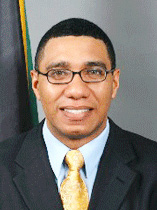(Jamaica Observer) MALVERN, St Elizabeth – Education Minister Andrew Holness is targeting the end of October for completion of a rehabilitative residential school now under construction to serve “disruptive students”.
“We expect to be ready by the end of October. We already have the programme established, the curriculum established and we have started to recruit teachers already,” Holness told journalists following a tour of the facility, Thursday afternoon.
Located across the road from the prestigious Munro College in the community of Potsdam, high in the hills of Malvern, the facility to be known as the Malvern Special High School will house 40-60 boys of high school age for a maximum of six months.

The sloping, three-acre property with a number of unfinished buildings which boasts a bird’s eye view of the Pedro Plains and the southern St Elizabeth coastline was bought by Government from the Jamaica Football Federation (JFF) for just over J$30 million last year. This after the JFF abandoned plans for a football academy at what was once a private development known as Munro Villas.
Officials said Thursday that construction – which was ongoing during the tour on Thursday – would cost J$51 million when completed in October.
Project architect Sean Wright told journalists that in addition to space for lectures and extra curricula activities, the school will include “five dormitories with accommodation for housemasters and housemothers”. A number of rain water catchment tanks which will be “chlorine-treated” are in place to meet the school’s water needs.
Holness emphasised that the Malvern Special High School would not be a “remand centre, not a place where children are locked up” or a “detention centre” but would function as an environment for education and rehabilitation. It would serve children who were close to being evicted from school because of their behaviour or were so disruptive their teachers had “given up” on them. It would not cater for those who had already “committed themselves” in criminals acts and were due to face the Courts, he said.
“This facility is really designed to reach those students before they commit themselves and come in contact with the law,” Holness said.
“The concept behind the school is to present an alternative to students who are otherwise challenged in their present school environment. Principals and teachers have complained that there are students in their charge who are over and above their capacity to manage – they (students) give their schools significant challenges in terms of their behaviour and are often disruptive,” the Minister said.
“The ministry therefore developed a strategy whereby those students could be pulled from their existing school environment and treated in a environment more conducive to behaviour management,” he added.
He stressed that the “objective” of the six month programme would be to return students to “mainstream education” within the high school system. The programme would include “specialists, psychologists, counsellors, doctors and special teachers,” Holness said. Great care was being taken in selecting staff, he told journalists.
Therapeutic
He suggested that the “therapeutic environment with a lovely view … very cool and secluded” meant most students would not want to leave before their rehabilitation is deemed complete.
Only parents would have the authority to pull their children from the facility before course completion, the Education Minister said.
While the facility would be operated free of cost, Holness said “as in every school that we operate, we ask parents to make a (voluntary) contribution … “
In terms of the demand for “school spaces” for “disruptive children” the special school in Malvern was “just a start”, the Minister said. It had been estimated that “under five per cent” of Jamaica’s high school population “could be considered disruptive, above the capacity of the school to manage”, he said.
The Malvern facility would be expanded over time to accommodate 100-120 students and in time other facilities would be built across the island. “We are already looking at a facility in Portland, that would be our next special school,” Holness said.
The overall intention, Holness said, was to correct cases of “parental failure, systems failure and where the state has failed in terms of managing that child … we have to play a very proactive role in ensuring that our institutions don’t fail our students that our parents don’t fail our students that the schools don’t fail the students and that we do everything possible to rescue our students.”




